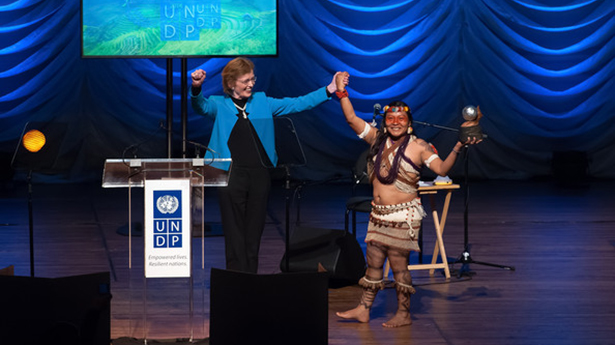Photo of Mary Robinson and 2014 Equator Prizewinner Alicia Cahuilla
Congratulations to this year’s Equator Prize winners! Last week, the United Nations Development Programme announced the 20 outstanding grassroots groups that won the prize for their work to advance sustainable development for people, nature, and resilient communities. We are thrilled that six current and former grantees who are among this year’s honorees. Incredible activists like you and your fellow prizewinners give us hope for our collective future.
In addition to successfully demarcating the Sawré Muybu territory (creating a political imperative for the Brazilian government to permanently protect Munduruku lands), the movement was the driving force behind a groundbreaking protocol on the right to free, prior and informed consent.
About their grant: The Tapajos Basin is home to rich animal and plant life, and over 820,000 people. But the region is threatened by mega-dam projects on the Tapajos River that would flood these biodiverse lands. A $5,000 grant in 2015 is helping the Munduruku indigenous people protect their territory against development and extractive industries, and push for official recognition of the territory by the government.
Since 2004, the institute has protected 2.5 million hectares of indigenous lands, including the largest remaining segments of the Amazon rainforest.
About their grant: The proposed Belo Monte dam on Brazil’s Xingu River would devastate a large area of rainforest. With a $1,850 grant, Instituto Raoni worked to ensure that opposition by the Mebegokre indigenous people was heard by decision makers in Brasilia.
Prey Lang Community Network – Cambodia
The network uses forest patrols and smartphone technology to geo-reference, document and upload information about forest health, illegal logging and wildlife poaching. As a result of their work, the Government of Cambodia drafted a sub-decree to make Prey Land a protected forest.
About their grant: With a $5,000 grant, the group collaborated with EarthAction Alerts Network to launch a global informational and advocacy campaign to protect the Prey Lang forest from development projects.
Comite Para La Defensa y Desarrollo de la Flora y Fauna del Golfo de Fonseca – Honduras
The group has successfully campaigned for the established of nine protected areas, the declaration of a 69,711-hectare Ramsar site and the creation of a vibrant, citizen-driven environmental monitoring network.
About their grant: A donor-advised grant in 2002 helped the group support wetlands protection and encourage sustainable economic growth in rural communities.
Moskitia Asla Takanka – Honduras
The group protects a large part of the remaining intact rainforest in Honduras, approximately 1.2 million hectares or 7% of the national territory.
About their grant: We have given many grants Moskitia Asla Takanka to help Miskito people demand title to their land. Read more about what MASTA has achieved here.
Yunnan Green Watershed Management Research and Promotion Center
Formed in response to a 1998 Lashihai dam project that flooded large areas of farmland and left the Yi indigenous people displaced, the Yunnan Green Watershed Management Research and Promotion Center has become a model of indigenous self-organization and participatory watershed management.
About their grant: To assess the impact of hydropower dams on ethnic minority rights in western China, the group used a $5,000 grant to prepare a policy suggestion to the newly appointed state council supporting natural rights to resources and cultural rights.
Our grantee Asociación de Mujeres Waorani del Ecuador was awarded the 2014 prize for successfully steering their local economy away from clear-cutting, poaching, and new fossil fuel exploration. Read about their work.
We congratulate all of this year’s Equator Prizewinners for making enormous strides for people and our planet. Thank you for your work and tireless energy.
Photos: UNDP Equator Prize, Elizabeth Weber

